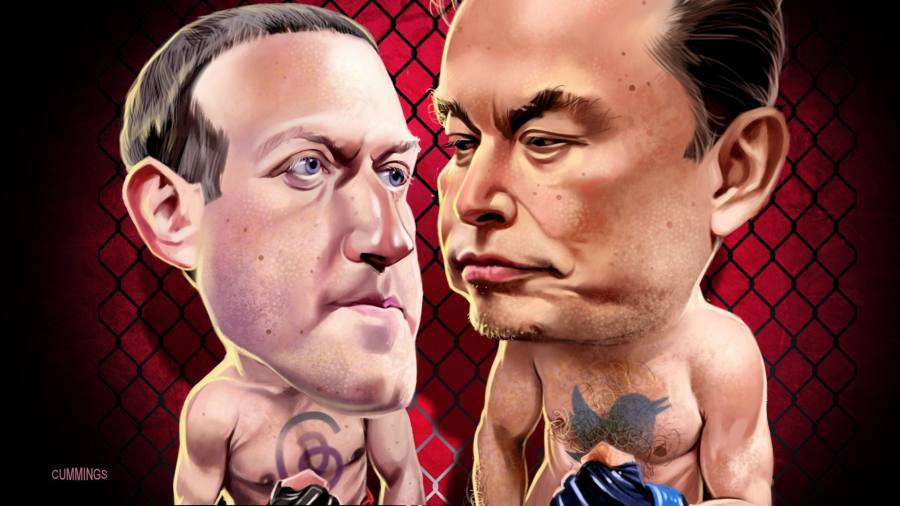Receive free Person in the News updates
We’ll send you a myFT Daily Digest email rounding up the latest Person in the News news every morning.
If Mark Zuckerberg and Elon Musk’s recent sparring online is to be believed, the two entrepreneurs will soon face off in a “cage match” in Las Vegas or Rome. The president of the Ultimate Fighting Championship, Dana White, has said he is trying to organise this real-life clash of the tech titans, claiming that both are “deadly serious” about the event, first touted as a joke by Musk. “This would be the biggest fight ever in the history of the world,” White said.
A billionaire brawl would indeed mark the greatest act of showmanship yet from the heads of the world’s most powerful social media platforms. But this week, the pair started a far more consequential battle — one that could dramatically reshape the landscape of the $231bn industry.
Since he bought Twitter for $44bn in October 2022, Musk has gutted its workforce, peeled back its moderation and made impulsive changes that have galled users and advertisers, leaving it teetering on the edge of bankruptcy earlier this year.
In an act of opportunism, this week Zuckerberg launched Threads, a Twitter clone aimed at toppling Musk’s app and luring its disaffected users. Zuckerberg said he aimed to build a “friendly . . . public conversations app with 1bn-plus people on it”, adding: “Twitter has had the opportunity to do this but hasn’t nailed it”.
The rollout was a runaway success, with some 70mn users by Friday. A testy Musk threatened to sue Meta for allegedly poaching Twitter’s fired workers and deliberately wielding their “confidential” knowledge of the platform to build Threads. “Competition is fine, cheating is not,” he wrote.
But it is too early to crown Zuckerberg the social media victor. Threads still lacks vital functionality and a plan for wooing the journalists, academics and news outlets that drive many Twitter conversations. The pair may also battle over video and artificial intelligence. “In a [WWE] wrestling saga I consider this spectacle as an equal match, both at an ego level and tech level,” says Greg Kidd, one of Twitter’s early investors.
The rivalry between Zuckerberg, 39, and Musk, 52, dates back many years, according to their associates. “They’ve always hated each other,” says one top tech investor who knows both, adding that Zuckerberg was “furious” when, in 2016, a SpaceX rocket carrying a satellite linked to a Facebook initiative blew up. In 2018, when #deleteFacebook began to trend during the Cambridge Analytica scandal, Musk joked “What’s Facebook?”.
On balance, Zuckerberg has owed much to Musk lately. The latter’s perceived mishandling of Twitter, alongside constant spats with high-profile figures, has distracted from the years-long drumbeat of scrutiny of Meta: as a factory for fake news, plunderer of privacy and destroyer of democracy.
And it was Musk’s brutal downsizing of Twitter that paved the way for Zuckerberg to announce his own deep lay-offs earlier this year with little pushback, as he attempts to revive Facebook’s popularity. “Zuckerberg has got a huge strategic problem — and Threads represents the best opportunity for him to minimise the damage,” says Roger McNamee, an early Facebook investor who has become a vocal critic.
Meanwhile, the media’s fixation with Musk (which he often encourages) has created space for Zuckerberg to undergo his own reinvention as a sports bro with a penchant for mixed martial arts. “Zuckerberg has this desire to be the most important person on earth . . . It’s always about the scale,” says one person familiar with his thinking.
In Silicon Valley, respect is bestowed on those who innovate. But where Zuckerberg’s biggest bets — on crypto and the metaverse — have failed to gain much traction, his other modus operandi has been to imitate rivals’ features unashamedly, attracting enemies and antitrust-scrutiny in the process.
In 2004, the Winklevoss twins sued Zuckerberg, claiming he stole their business idea and source code for what would later become Facebook itself. Since then, the clone of Snap’s disappearing short video feature, in the form of Instagram Stories, has become central to the platform, while Reels, Instagram’s TikTok equivalent, is slowly gaining ground.
But Zuckerberg, a fan of Augustus Caesar and the Roman emperors, did come up with one original stroke of genius in his latest efforts. By linking Threads to Instagram, users have been able to generate a network and the feed of engaging content that come with that. This makes the app instantly sticky. When it starts to monetise, “Meta is well positioned to take all the advertising that left Twitter,” one advertising agency executive says. “Twitter needs to do something big and fast.”
The pair will have more to fight over, including creator talent. Both want to integrate more payments and shopping to their platforms. And both men are now scrambling to become dominant AI performers. Musk is working on a new start-up to rival OpenAI, which may wield Twitter’s data to power its models. Zuckerberg, with deeper pockets, is equally ramping up Meta’s investment in AI internally.
Still, there are those who remain sceptical about the pair’s prospects, pointing instead to platforms such as ByteDance’s TikTok as the real innovators. Another early Twitter investor says: “It’s a fight for the world championship of irrelevancy — who is dying the fastest, Twitter or Facebook? Neither are going to be a key part of the future but it’s entertaining to watch the egos battle it out.”
Read the full article here





